Do you want to a footballers diet that will help fuel your body like a professional player?
Then you’re in the right place.
This page will break down all areas of football nutrition to give you the secrets to take your game to the next level.
The best part?
These nutrition tips and fueling strategies can be implemented today and help improve your performance right away!
So, are you ready to take your football diet more seriously?
Let’s get started!
CONTENTS
Footballer’s Diet
CHAPTER 1
What is a Football Nutrition?
This chapter will give you a brief overview of the vast areas that come under sports nutrition.
The football nutrition industry has grown rapidly in the last 10-15 years and with it so have the marketing messages from health and supplement suppliers.
The sheer number of conflicting statements you hear on the radio, in gyms, on TV and social media creates mass confusion.
Before we clear some of this confusion it’s important to understand all the areas that come under football nutrition
This image shows all the key areas of nutrition for football players. This can cover anything from nutrient timing, supplements and preparation and even the optimum fluid intake needed.
There are many areas to consider when discussing football nutrition including:
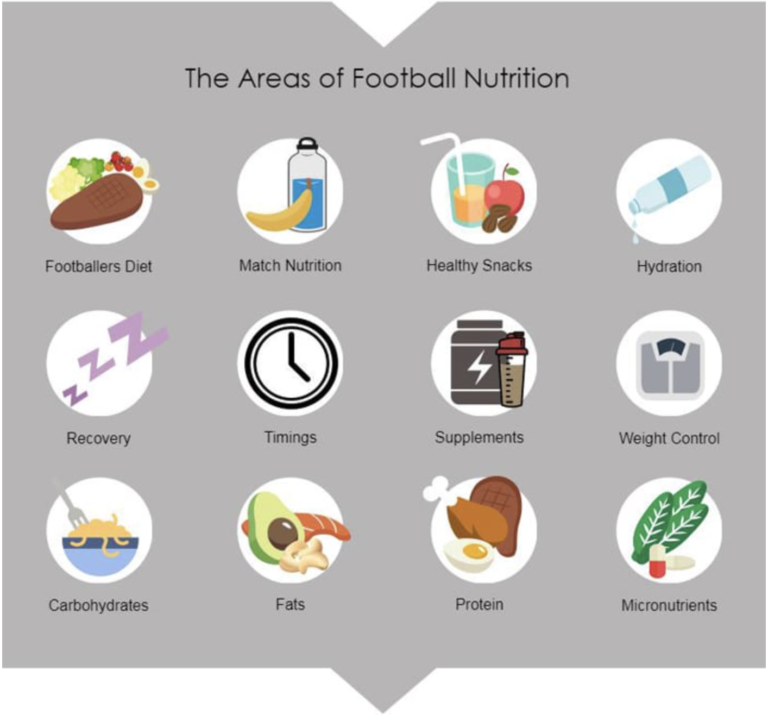
What is the difference between Football Nutrition and nutrition?
The best place to start is understanding the difference between sports nutrition and normal nutrition.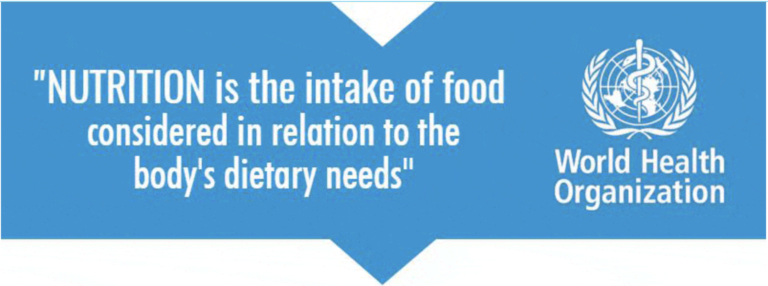
However, the definition for Football nutrition is slightly different:
"FOOTBALL PERFORMANCE IS THE SPECIALISED BRANCH OF NUTRITION THAT STUDIES FOOD WITH RELEVENCE TO ATHLETIC PERFORMANCE"
~ definition ~
So football nutrition doesn’t look at what the body’s dietary needs are, but what you need to improve performance on the field and in training.
It doesn’t matter how you train or workout, you need to appreciate just how important sports nutrition is, as you can’t out exercise a bad diet.
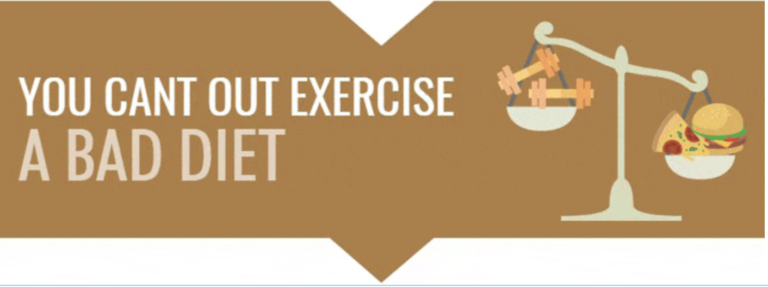
Benefits of Football Nutrition
- Eating a healthy balanced diet helps to refuel your energy system, allowing you to train and play at a higher intensity for longer.
- Proper football nutrition can help you reach weight loss/gain targets.
- Eating the correct foods boosts your immune system, preventing colds and flu throughout the season.
- Proper fueling can dramatically improve your performance especially as you get to a higher level of football.
- Delays Fatigue – which is one of the ultimate goals of our workouts, so we can stay energised for longer
- Can protect you against injury
- Enhances our concentration levels – No matter what position you play in, you must concentrate for the full 90 minutes
CHAPTER 2
This chapter highlights exactly what is essential within a footballer diet.
Check out this FATV video on the importance of nutrition in football.
The Best Footballers Diet Plan
First off:
- Your Footballers diet and training program should go hand in hand
- And there is no one size fits all diet for a player
So…
You need a plan that is tailored to your needs as fuel requirements can and will change throughout the season.
So a premiership footballers diet plan would differ to a Sunday league player.
Planning your nutrition is as important as your on-field and gym training.
The best thing is:
Fueling your body correctly provides more gains from your exercise, so you get more out of the same amount of work. Or even better, you’ll have more energy to do more work in your training sessions.
Your diet needs to include:

Pre Match Nutrition
What do footballers eat before a match

During Match Nutrition
How to stay fuelled throughout your match

Post Match Nutrition
What to eat and how to recover quickly
CHAPTER 3
Footballer Energy Needs
What Type of Nutrition Do Players Need?
Your body’s get energy from Carbohydrates. Therefore… Foods high in carbs are very important for a player. However, knowing what amount and the best window to consume these carbs are essential for performance and recovery. More on this below. Protein-packed foods are also important as they build and repair muscles. The optimal time to consume protein is post-match or training, to encourage muscle synthesis and prevent the body using its own muscle for energy. Most elite players drink a protein shake as it is quick and easy to prepare. Small amounts of Vitamins and minerals will help your body work properly. Fluid is another very important part of your diet as your sweat increases you lose fluid and need to replenish to be able to perform. Check out our guide to hydration for more info.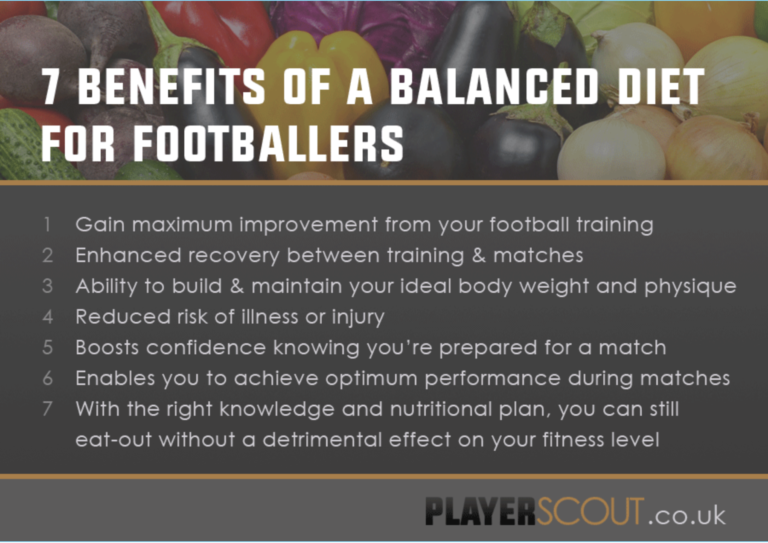
With all these great benefits its a wonder why players at all levels find it hard to maintain a balanced diet. We hear all sorts of excuses why players cheat on their diet. Here are some of the most common, see if any of them resonate with you:
- “I can’t cook”
- “I don’t know enough about healthy food and drink”
- “There are no healthy options in my local supermarket or when i eat out”
- “Nutritional information online is so conflicting and confusing”
- “I can’t afford all of these healthy options”
- “I don’t have time to prepare and eat healthy food every day”
- “It’s hard to have the right food if we have a long away trip”
- “I use a load of sports supplements to make up for it”
How Much Energy Do Football Players Need?
Football is a highly demanding sport. You complete a series of high-intensity sprints, jumps, tackles, and shots throughout the game which all use energy to perform.
The graph shows how your energy is used throughout a match:
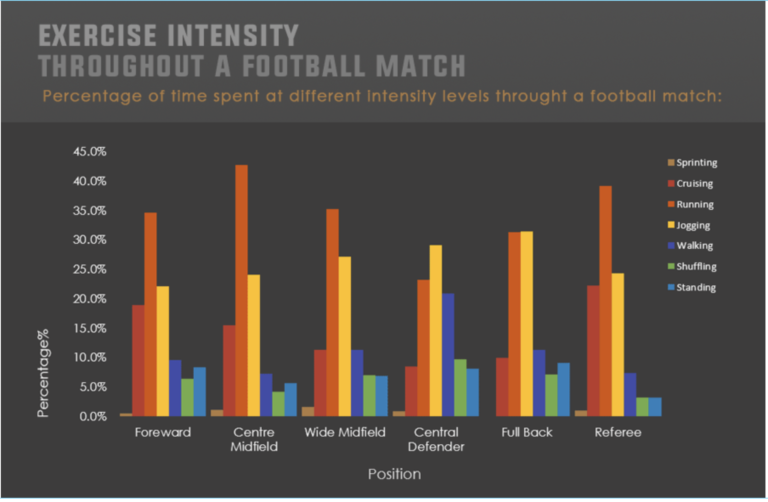
Throughout a match, you will perform a series of movements of different intensity depending on your position and fitness level.
This mix of low and high-intensity work means your body temperature and heart rate will demand a lot of energy.
As a player, you may perform up to 250 sprints in a competitive match.
Late on in games, these sprints put pressure on your body’s anaerobic energy system, causing the muscles to tire or fatigue.
This is caused by low glycogen stores in your muscles (carbohydrates are stored in your liver and muscles as glycogen).
When these glycogen levels drop, your muscles fibers may stop contracting, which reduces your ability to perform tricks or accelerate.
"THE MORE GLYCOGEN, THE FURTHER AND FASTER THE PLAYER RAN"
~ Kirkendall ~
Everything you eat will provide your body with energy for immediate use or added to your body’s energy stores.
These energy stores are important as they contribute to:
- Your body’s physique and size (muscle mass and body fat)
- Your body’s exercise fuel (Carbohydrates stored in the liver and muscle)
- Your overall bodily function
Your body will need extra energy (than your daily needs) on the days you have training or matches.
Also, your energy demands will be lower throughout the offseason or when injured. During these situations, you will need you to change your diet to cater for lower activity.
As energy needs vary between players, heavier or overweight player will need more energy to travel the same distance as a lighter player.
CHAPTER 4
Macro and Micronutrients
This chapter will show you the best macro and micro-nutrients to include in your football diet.
Carbohydrates for Footballers
Despite what you have heard, carbs are essential to a footballers diet, as they are the body’s main energy source.
However…
Your body can only store a limited amount. So you need to plan daily for training and non-training days, to ensure you have fuel for exercise and for recovery.
Guidelines for carbohydrate intake for football players:
Immediate Recovery- 0-4 hours after matches or training: Eat 1g of Carbohydrate, per kg of your body weight, per hour.
- After low-intensity football training: Eat 5-7g per kg of your body weight per day
- Eat 7-10g per kg of your body weight per day
- Eat 7-10g per kg of your body weight per day
High Carbohydratin Meal Ideas
When choosing Carbohydrates, you are looking for options with a moderate to high glycaemic index (GI). These will be the basis for all of your recovery meals. If you are playing an evening game or an away match, make sure you eat the required amount before your set off on your journey home. This will ensure your recovery process isn’t delayed.
Check out our carbohydrates guide for a more detailed look at how much carbohydrates a player needs before, during and after matches.
Protein For Footballers
There are a huge variety of protein foods and products on the market, so their no excuse for not hitting your daily proteins needs.
Amino acids in protein help:
- Your metabolism
- Build and repair muscle
- The function of your body by building hormones and enzymes
- Energise the body
On days when you perform resistance training, your protein needs can increase by up to 70%.
However…
Having a planned diet of nutrient-rich foods will enable you to reach your desired protein needs without supplementation.
Overconsuming protein will not help in your training gains and will become expensive, so be sure your diet is balanced and not a high protein diet.
Timing is key…
Protein consumption is more about when rather than how much.
Research suggests that 20-25 grams of high-quality protein taken straight after exercise can combat protein breakdown and increase muscle growth and repair.
But remember…
You should always look to get your protein needs from nutrient-rich food. However, if you need an extra top up, then some sports bars or liquid meal supplements can be an adequate alternative.
Although these compact protein options can be very expensive.
Here are some high protein meal ideas:
Vitamins, Minerals, and Anti-Oxidants
The best sources for all of your nutritional needs are nutrient-rich foods. Such as:
- Legumes
- Beans
- Fruits
- Vegetables
- Grains
- Fish
- Dairy products
- Unsaturated oils
- Lean meats
Football Players must have adequate amounts of the below for optimum performance and health:
- Iron
- Copper
- Manganese
- Magnesium
- Selenium
- Sodium
- Zinc
- Vitamins A, C,E, B6 and
- B12
As with proteins and carbohydrates, you should be able to reach the correct amounts of vitamins and minerals needed from your everyday diet.
However…
You may be at risk of not reaching the recommended levels if you:
Don’t eat or drink for long periods to lose weight
You lack variety in your diet
You eat foods low in nutrients
There may be times when you cannot purchase fresh nutrient-rich food, or your body may just be lacking in a specific vitamin or mineral.
In these situations, you may need a safe supplement to replace these deficits.
The most common supplements are multivitamin or mineral supplements.
You may also require a more targeted nutrient supplement if you have a specific deficiency.
Antioxidant Nutrients for Footballers
Football training and matches increase the body’s need for antioxidants. Specific antioxidant nutrients protect the tissues in the body when you train or workout. A healthy diet will create all the defenses that your body requires after high-intensity exercise. However… Antioxidant supplements are sometimes used for any low deficits.4 Ways to consume more nutrients:
- Try new recipes and food often
- Try to always eat foods that are in season
- Mix up your diet and explore different foods
- Include vegetables and fruits in every meal
How much calcium should a footballer consume?
It is very important that you have healthy strong bones to compete at any level.
The best nutrient to look after your bones is calcium.
Found in dairy products, adult players should try to consume three servings of calcium per day. Whereas, younger players will have an increased requirement during their growth and development.
Some great natural sources of calcium are:
- Cheese
- Yoghurt
- Milk
- Spinach and Kale
- Raisin Bran, Corn Flakes
- Orange Juice
- Soybeans
CHAPTER 5
Nutrient Timing
The timing you take in nutrients is important. This section will highlight the different phases of nutrient timing to aid your performance and recovery.
Our nutrition plan will give you science backs advice on the best times to eat centain foods to improve performance, speed up recovery and prevent injury
So what is Nutrient Timing?
Nutrient timing is knowing what to eat before, during and after training and matches.
These specific timings help players at all levels gain an advantage in their performance and recovery.
There are 3 key phases in Nutrient timing:
The Energy Phase – This is just before training and matches
The Anabolic Phase – This is 45 minutes after the match or training
The Growth Phase – This period covers the rest of the day
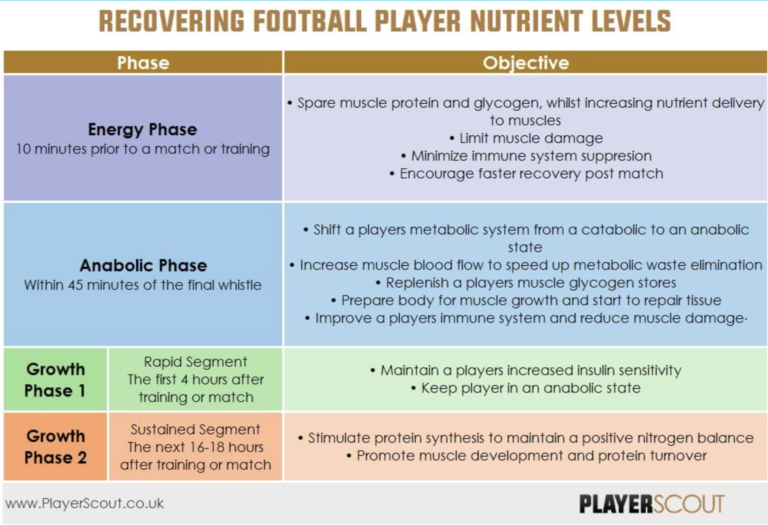
What is the Energy Phase?
Muscle glycogen is the main source of fuel during a match. When these glycogen levels are low, you cannot perform at a high intensity and muscle fatigue kicks in.
Therefore…
The Energy Phase is a crucial time for players to top up their glycogen levels and prepare for the match.
During this phase:
- Cortisol levels increase
- Muscle glycogen levels are depleting
So the aim of this phase is to deliver more carbohydrates and protein to the muscles.
This will lower muscle damage and aid in a faster recovery.
Once the match has finished, we move into the Anabolic Phase of nutrient timing.
What is The Anabolic Phase?
This phase is the most important phase for a players recovery and injury prevention.
Eating nutrients within 45 minutes after a match is far more effective than 2-4 hours after a game.
Feeding our muscles will provide now will:
- Maximise gains in strength
- Increase muscle endurance gains
- Decrease inflammation
- Repair muscles
Carbohydrates are essential to the body within this 45-minute window, resulting in a faster uptake of glycogen storage and muscle recovery.
The Growth Phase
What good is all the training and playing if your body isn’t improving?
The 18-20 hours after a match is when your muscles recovery repair and grow.
Eat a meal comprising both carbohydrates and protein within 1 to 3 hours after your training or match.
Aim for high glycaemic carbohydrate meals as these meals are digested quicker and improve your glycogen stores uptake.
CHAPTER 6
What Do Footballers Eat For Breakfast
Breakfast is the most important meal of the day. This section will provide a brief overview of what foods you should take on in the morning to help fuel your training and game.
Footballers Breakfast
Breakfast is the most important meal of the day.
After 8 hours sleep, your body is in a fasted and dehydrated state, so you need to fuel as soon you as you.
Missing this important meal will have negative effects on your training and match performance.
Studies show that consuming breakfast had both mental and physical benefits, which can be transferred to a footballers training plan.
A footballers breakfast should consist of around 600 calories (depending on your daily needs). These calories should be:
50% Carbohydrates such as:
- Fruits
- Vegetables
- Whole Grain Cereal
- Whole Grain Bread
25% Protein / 25% healthy fats
Pick foods with containing both such as:
- Eggs
- Nuts
- Seed
- Peanut Butter
- Milk
- Cheese
- Yogurt
- Meat
As soon as you wake you should drink a glass of water to rehydrate, followed by a second glass as you eat breakfast.
If you struggle drinking just water, you can flavour with some fruit slices, lemon, or berries in ice cubes work great.
Eating whole fruit in the morning is great and has benefits over just drinking fruit juices including:
- Contains fiber which helps with digestion
- Antioxidants in pulp and skin.
It is also a great idea to have a hot drink for breakfast. Green tea, Black tea, and coffee help prevent disease and boost the immune system. Plus Caffeine:
- Provides energy
- Promotes endurance
- Enhances Metabolism
CHAPTER 7
Matchday Diet Plan For a Footballer
This chapter will show you how you should eat on a matchday for optimal performance.
If you want an easy to follow footballers nutrition plan then try our football nutrition ebook and 4 week plan.
Matchday Breakfast for footballers
As we mentioned earlier breakfast is the most important meal of the deal, and this is also true on a matchday. One of the most popular breakfast for players is porridge, as it gives of a slow release of energy. Too ensure your tastes buds don’t get bored, try mixing up your porridge each week by adding various fruits, banana, blueberries of honey. Add a splash of semi skimmed milk (as much as you prefer), as this will help keep your bones healthy. For players who do not like porridge, a high protein egg based breakfast is a great option. Scrambled, poached or omelettes with a mixture of toppings provide a great variety of recipes to ensure you have a pre match breakfast menu throughout the season. However always choose rye or wholemeal bread over white bread, as these are complex carbs. Avoid eating fat, fibre or heavy food on a matchday. You want to take on foods that are easy to digest and wont leave you feeling sluggish.Matchday Lunch for Footballers
Your kick off time will play a big factor in what (if anything) you have for lunch. We have more on this in our football nutrition plan. However for a 3pm kick off you want to aim for a balanced easy to digest meal for lunch. Again you should look to take on foods low on the glycaemic index table, such as wholemeal and grains. Protein rich foods like fish and meat can also be added to this dish, along with healthy veg. Drink 750ml of water with your meal.Pre Match Nutrition for Footballers
The 60-90 mins before a match are a great chance to top up your energy levels before kick off. This is a great time to take on fluid and topping up your glycogen levels. Sports drinks are great for this. Also depending on your hunger levels, fruits such as a banana or apples can be taken on to give you an extra energy boost.Halftime Nutrition for Footballers
The main aim for your halftime replenishments is to replace fluids lost and energy used throughout the first half. Therefore you should look to take on easily abosbed carbohydrates in the form of a sports drinks. The body can take this in rapidly and they can start to replace lost energy and salts immediately.Post Match Nutrition For footballers
The period immediately after the match is when your recovery begins. You need to replace the energy used and repair your muscles. This is where carbs and protein come into play. The amount you need to take in depends on your size and activity level and we cover this is more depth in out football nutrition plan. However you want to take in 3g of carbs to every 1g or protein.CHAPTER 8
What do footballers drink?
This chapter will go over some of the key areas of staying properly hydrated throughout the day.
If you want to learn know how to hydrate to combat your sweat rate and improve your performance the download our footballers diet nutrition plan.
Hydration Tactics
Staying hydrated is key for any footballer. This can be the difference between performing your best, running our of energy or even getting injured.
So its important for players to understand how to hydrate and know when they fully hydrated.
Staying hydrated doesn’t just mean drinking water after a match. Their is a science involve to making sure you plan out what and when you drink.
A proper hydration plan will enable you to know:
- Your daily hydration needs
- How to test for dehydration
- How to calculate you sweat rate
- The best hydration drinks for each situation
- The best hydration supplements
Check out this BBC experiment which shows the effects of dehydration on physical and mental performance.
Want to find out what footballers drink?
Well, we answer all plus ensure you are clued up on the above in our guide to proper hydration.
If you want to understand the effects that alcohol has on a footballers diet check out of guide to alcohol intake in footballers.
CHAPTER 9
Supplements For Footballers
This chapter will go over some of the key areas of staying properly hydrated throughout the day.
Our football nutrition guide provides an in-depth guide to safe supplements for footballers, highlighting the benefits of each supplements and daily recommended amounts.
Sports supplements are becoming more and more popular in the modern game.
As the pace and competitiveness increases, players seek every opportunity to gain a legal advantage over their competition.
Supplements can help to give players that advantage by:
- Providing energy
- Helping the body use this energy
- Improving recovery
- Improving focus
- Help with weight management
- Improve immune system
- Reduce risk of injury
- Build and repair muscle
- Prevent Disease
- Decrease pain in muscles
- Decrease fatigue
- Improve endurance
- Improve oxygen and nutrient delivery
- Remove CO2 and acidity from your body
- Reduce inflammation
- Improve joint health
To find out more about our safe supplements from protein to fish oil, the rules of supplementation in football and the AIS supplements classification check out our supplement guide.
Here’s a quick look at how Reading FC have added Science In Sport nutritional products to their football diet.
CHAPTER 10
The following is a list of foods that you should start adding to your shopping list today.
Find out how you can include healthy foods like these to your diet to improve your healthy, energy, recovery and performance.
1. Milk
Milk is essential to your recovery after training and matches. Its high protein content helps to repair muscles and instigate the recovery process. As if that wasn’t enough, the calcium in milk helps to build healthy bones and teeth.2. Avocados
One of the most popular superfoods around nowadays is the Avocado. They are high in fiber and healthy fats, which help to keep your body functioning and gut healthy. Avocados are a superfood because they contain the following nutrients:- Copper
- Folate
- Iron
- Magnesium
- Manganese
- Phosphorous
- Potassium
- Vitamin A
- Vitamin B1
- Vitamin B2
- Vitamin B3
- Vitamin B5
- Vitamin B6
- Vitamin C
- Vitamin E
- Vitamins K
- Zinc
3. Chia Seeds
These tidy low calorie seeds are full of vital nutrients which help performance and recovery. They are high in:- Protein
- Omega 3
- Fiber
- Calcium
4. Blueberries
Another superfood that are growing in popularity are blueberries. These are not only great to add to your post exercise recovery but also readily available in any supermarket and taste great on their own or mixed with many other recipes. (check out of football nutrition plan for great recipe ideas). Blueberries are packed full of antioxidants (highest of all popular fruits) that help to reduce the free radicals that are produced by your body as your exercise. They are low in calories, but high in vitamin C, K and fiber. They also:- Protect against and prevent ageing
- Lower blood pressure
- Help prevent heart disease
- Improve memory and help maintain brain function
- Reduce muscle damage after intense training
5. Broccoli
Broccoli contains a huge amount of nutrients that allow it to clearly be classed as a superfood. Pound for pound it contains more Vitamin C than an orange, which helps players fight against oxidative stress and free radical build up in the body. The high amounts of fiber in steamed broccoli helps to fight against bad cholesterol build up in your blood, whilst the vitamin A and K help to support your bodies intake of vitamin D. Another great benefits for players is the anti inflammatory properties of broccoli, which is great for any person who performance strenuous exercise. Broccoli can be added o many recipes and salads to ensure you get the right amount in your diet, or if you prefer to juice your veg, try adding a few stems to your green morning smoothie and start reaping all the benefits today6. Beetroot
Although beet juice is now class as performance enhancing supplement, we felt it important to also add raw beetroot this list. It is easy to add to a number or recipes, tastes great and is relatively cheap to buy. Performance benefits of beetroot include:- It reduces inflammation
- Provides energy
- Improves recovery
- Helps with mental focus
- Boosts your stamina level
7. Oily fish
Wild caught oily fish like Salmon are packed with healthy fats that provide many benefits for total bodily function. The Omega 3 in these types of fish help to:- Reduce inflammation, which allows your to return to training sooner and train more often
- Improve your immune system
- Lower the risk of heart disease
- Helps reduce anxiety and stress
- Eases joint and bone aches and pains
- High in protein which helps to repair and build muscles.
8. Coconut Water – Mother Natures Sports Drink
One of the best fluids to take on board is coconut water. It not only helps to keep you hydrated but is also full of minerals and nutrients that help improve athletic performance and recovery. Coconut water is low in calories, and is a natural method to help re hydrate the body after matches. It is packed full of potassium (4 times more than a banana), which can help any player who’s diet is lacking in this area. However, do not drink too much coconut water as it can cause an upset stomach if over consumed. It is not a replacement for water.CHAPTER 11
Lionel Messi’s Diet
Here is a snapshot of Lionel Messi’s pre match nutrition plan.
If you want a nutrition plan that will help to improve your performance, recovery and overall health, then download the PlayerScout football nutrition plan today!
Lionel Messi’s Diet Example
Here is an example of an elite footballers diet plan. Players often work with sport nutritionist to adjust their diet throughout their career. Below is an example of Lionel Messi’s pre match meal plan that spans over a 10 day schedule before a match:10 Days before the match
During this period:This diet is known as a low carb high protein diet. As the body is low on carbohydrates it gets energy by burning fat. This is ensures Messi cuts down on excess weight whilst building muscle mass. As he gets closer to the game and introduces Carbohydrates, it will boost his stamina and energy in the closer to the game.
- Cuts down his Carbohydrates and increase his protein intake.
- Drinks 3 protein shakes a day
- Drinks 7-8 glasses of water to avoid dehydration
5 Days before the match
During this period:
- Messi eats vegetable soup before every meal.
- Main ingredients of this soup are: Ginger, Coriander, Chilli and Turmeric.
- These ingredients help to increase blood flow and the soup help Messi to hydrate.
1 Day before a match
- Messi will have prawns, fish or chicken with a boiled potato, green vegetables and an orange.
6 Hours leading up the match
During this period:
- Messi steers clear of wheat products
- He opts for a bowl of porridge and egg whites for a mix of carbohydrates and protein.
90 Minutes before the match
During this period:
- Messi only consumes exotic fruit
- Opting for Mangos, Bananas and Apples


